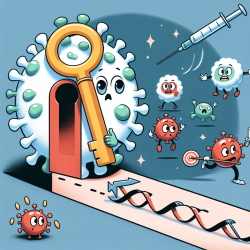Introduction
The intersection of genetics and speech-language pathology is a burgeoning field that holds promise for understanding and addressing developmental challenges in children. One such area of interest is the FOXP2 gene, a key player in speech and language development. A recent case report titled FOXP2 gene deletion and infant feeding difficulties: a case report sheds light on the potential implications of FOXP2 deletions on oral feeding in infants, offering valuable insights for practitioners.
The FOXP2 Gene: A Brief Overview
The FOXP2 gene, often dubbed the "speech and language gene," is located on chromosome 7 and is known for its critical role in normal speech development. Mutations or deletions in this gene have been associated with speech disorders such as developmental verbal apraxia. The case report in question explores a novel link between FOXP2 deletions and oral feeding difficulties in a newborn, expanding our understanding of the gene's impact beyond speech alone.
Case Report Highlights
The study detailed the case of a male infant born at 35 weeks gestation, who exhibited persistent oral feeding incoordination necessitating a prolonged stay in the neonatal intensive care unit (NICU). Despite being born prematurely, the infant's feeding issues were more severe than typically observed in preterm infants, prompting genetic testing. A microarray analysis revealed a 9-kb deletion within the FOXP2 gene, suggesting a genetic basis for the feeding difficulties.
Clinical Implications for Practitioners
This case report highlights the importance of considering genetic factors when assessing feeding difficulties in infants. For practitioners, this means:
- Being aware of the potential genetic underpinnings of feeding challenges, particularly in cases that exceed typical expectations for preterm infants.
- Incorporating genetic testing into the diagnostic process for infants with unexplained feeding difficulties.
- Collaborating with geneticists and other specialists to develop comprehensive care plans that address both feeding and potential speech-language issues.
Encouraging Further Research
While this case report provides a compelling link between FOXP2 deletions and feeding difficulties, it is based on a single subject. Further research is needed to confirm these findings and explore the broader implications for speech and feeding development. Practitioners are encouraged to engage with ongoing research efforts and consider participating in studies that investigate the genetic basis of feeding and speech disorders.
Conclusion
The FOXP2 gene's role in both speech and feeding development underscores the interconnectedness of these processes and the importance of a holistic approach to infant care. By staying informed about the latest research and incorporating genetic considerations into practice, speech-language pathologists and other practitioners can enhance outcomes for children with feeding and speech challenges.
To read the original research paper, please follow this link: FOXP2 gene deletion and infant feeding difficulties: a case report.










